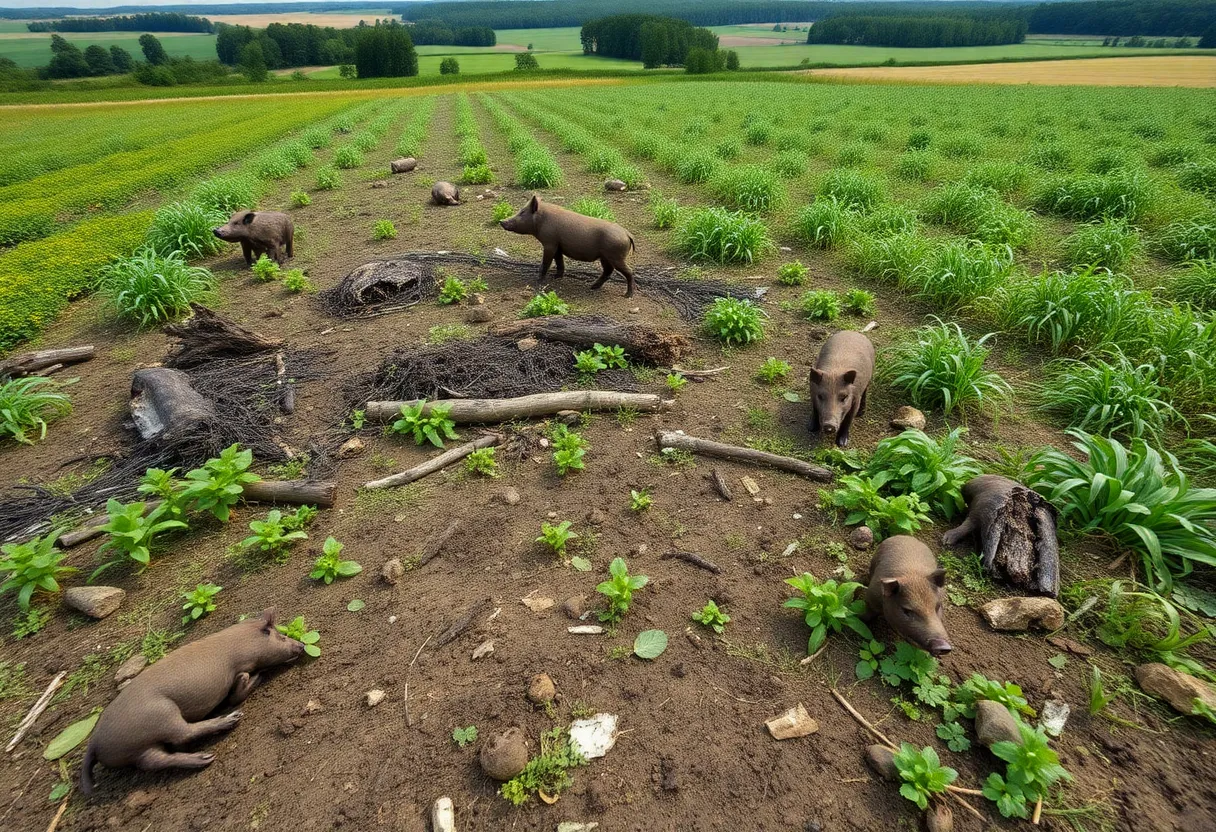News Summary
A study from the University of Georgia reveals that wild pigs are responsible for over $107,000 in annual agricultural crop damage in southwestern Georgia. Key crops such as peanuts, corn, and cotton are heavily affected by these invasive animals, which not only uproot plants but also destroy farming equipment. With wild pig populations growing rapidly, experts urge for improved management strategies to address this escalating threat to the agricultural sector and local ecosystems.
Albany, Georgia – A recent study from the University of Georgia (UGA) reveals that wild pigs, or feral hogs, are causing over $107,000 in agricultural crop damage annually in southwestern Georgia. This alarming figure highlights the increasing threat that these invasive animals pose to the local farming industry, particularly affecting key crops such as peanuts, corn, and cotton.
Researchers conducted an extensive study over two years utilizing advanced techniques, notably drone technology, to monitor thousands of acres of farmland. The findings indicate that wild pigs not only uproot seeds and trample young plants but can also chew through farming equipment, resulting in both direct and indirect economic losses. It is important to note that the reported crop damage does not account for additional financial impacts, including losses related to worker wages or the wear and tear on equipment.
The lead author of the study pointed out that damage from wild pigs extends beyond crops, disrupting native wildlife and vegetation. With their capacity for rapid reproduction, wild pig populations have grown significantly; sows can start breeding as early as six months of age, producing multiple litters averaging six to twelve piglets annually. This reproductive potential has contributed to a burgeoning population in the region, which is further exacerbated by an absence of natural predators.
Control measures such as culling and trapping have been implemented to manage wild pig populations. However, these efforts have proven insufficient in keeping pace with the exponential growth of the population. UGA researchers emphasize the importance of establishing robust and proactive strategies to tackle this issue comprehensively. Continuous removal efforts are deemed essential to mitigate further damage to agricultural crops and the surrounding ecosystems.
The impact of wild pigs on farms has become increasingly severe in recent decades. While these animals have been part of the U.S. landscape since the 1500s, the scale at which they now affect agriculture is a growing concern for farmers and ecologists alike. Furthermore, the researchers note that as wild pig populations continue to expand, the implications are reaching beyond localized areas, threatening new regions across Georgia.
To counteract this escalating problem, experts advocate for enhanced funding and policy adjustments directed toward invasive species control. Better management techniques and cooperative strategies among farmers, researchers, and policymakers are essential for curbing the adverse effects of wild pigs on Georgia’s agricultural output.
In conclusion, the increasing prevalence of wild pigs in Georgia and the economic consequences of their proliferation underscore a pressing need for a coordinated approach to control their populations. Addressing this issue effectively may not only save millions in crop losses but also preserve local ecosystems and the agricultural heritage of the region.
Deeper Dive: News & Info About This Topic
- Northwest Georgia News
- USA Today
- Pork Business
- 11 Alive
- Atlanta Journal-Constitution
- Wikipedia: Feral Hog
- Google Search: Georgia farms wild pigs
- Google Scholar: wild pigs economic impact
- Encyclopedia Britannica: Wild Boar
- Google News: wild pigs Georgia farmers

Author: STAFF HERE AUGUSTA WRITER
The AUGUSTA STAFF WRITER represents the experienced team at HEREAugusta.com, your go-to source for actionable local news and information in Augusta, Richmond County, and beyond. Specializing in "news you can use," we cover essential topics like product reviews for personal and business needs, local business directories, politics, real estate trends, neighborhood insights, and state news affecting the area—with deep expertise drawn from years of dedicated reporting and strong community input, including local press releases and business updates. We deliver top reporting on high-value events such as Arts in the Heart Festival, Westobou Festival, and Masters Week. Our coverage extends to key organizations like the Augusta Metro Chamber of Commerce and Greater Augusta Arts Council, plus leading businesses in manufacturing and healthcare that power the local economy such as Textron Specialized Vehicles, Cardinal Health, and Nutrien. As part of the broader HERE network, including HEREAtlanta.com and HERESavannah.com, we provide comprehensive, credible insights into Georgia's dynamic landscape.


